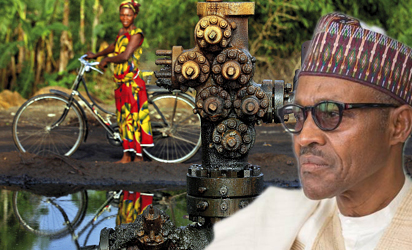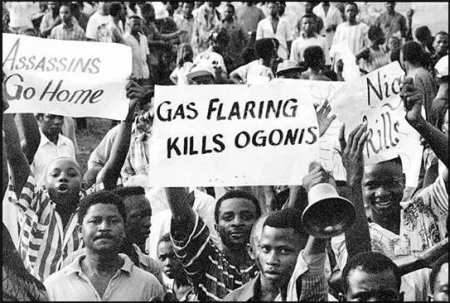P
ProfRem
Guest
The environmental restoration of Ogoniland could prove to be the world's most wide-ranging and long term oil clean-up exercise ever undertaken if contaminated drinking water, land, creeks and important ecosystems such as mangroves are to be brought back to full, productive health.
A major new scientific assessment, carried out by the United Nations Environment Programme (UNEP), shows that pollution from over 50 years of oil operations in the region has penetrated further and deeper than many may have supposed.
A statement from Chijioke Amu-Nnadi, the Head of Corporate Affairs unit of the Niger Delta Development Commission, in Port Harcourt, Rivers State on Monday confirmed that President Muhammadu Buhari will launch the Ogoni land clean-up on June 2.
It will be recalled that Buhari, who inaugurated a fish pond in 1984 where the once flourishing pond regrettably had been destroyed by oil pollution would return to Ogoni land where to restore the ecosystem to what it used to be and as such restore the peoples’ source of livelihood.

1. Ogoniland is situated in the Niger Delta region, the third largest mangrove ecosystem in the world. The region is divided administratively into four local government areas: Eleme, Gokana, Khana, and Tai. The Ogoni speak the related, mutually intelligible languages of Khana, Gokana, Tae (Tẹẹ), Eleme, and Ban Ogoi part of the linguistic diversity of the Niger Delta.
2. Ogoniland is a region covering some 1,000 km² in the south-east of the Niger Delta basin. It has a population of close to 832,000, according to the 2006 National Census, consisting mainly of the Ogoni people. The region has witnessed recurrent social unrest during the past several decades over concerns related to oil industry operations and the distribution of its revenue. More than £30bn of oil has been extracted from the area but the majority of people are worse off than before the companies arrived.
3. Oil exploration in Ogoniland commenced in the 1950s and extensive production facilities were established during the following three decades. These operations were handled by Shell Petroleum Development Company (Nigeria) Ltd (SPDC), a joint venture between the Nigerian National Petroleum Company (NNPC), Shell International, Elf and Agip. Environmental incidents, such as spills and uncontrolled flares, began in the area as soon as the operations began and responses were slow and inadequate.

4. In response to the environmental consequences of oil production, the Movement for the Survival of the Ogoni People (MOSOP) was founded under the leadership of the late Nigerian author Ken Saro-Wiwa. Saro-Wiwa criticized oil companies and the government’s oil policy.
5. The Abacha junta accused Ken Saro-Wiwa and eight others of killing four Ogoni chiefs who were on the opposing side of the Movement for the Survival of Ogoni People, MOSOP.
Saro-Wiwa and his colleagues were subsequently arrested, tried by a special military tribunal. Though they denied the charges against them, they were imprisoned for over a year before being found guilty and hanged on November 10, 1995.
6. In 1993, about 300,000 Ogoni joined a march to demand a share in oil revenues and greater political autonomy.
7. In August, 2011, Shell accepted full responsibility for two massive oil spills that occurred in 2008 and that devastated Bodo in Ogoniland where 69,000 people live and may take at least 20 years to clean up the land.
8. The Royal Dutch Shell and Brain Anderson, Head of its Nigeria Operations, were believed to have connived with the Abacha's government on Mr. Saro-Wiwa’s trial and execution.
The company denied the allegations, despite testimonies stating otherwise, and it agreed a $15.5 million out-of-court settlement in favour of the families of the victims in 2009, saying however that the payment was not a concession of guilt, but a gesture for peace.
A major new scientific assessment, carried out by the United Nations Environment Programme (UNEP), shows that pollution from over 50 years of oil operations in the region has penetrated further and deeper than many may have supposed.
A statement from Chijioke Amu-Nnadi, the Head of Corporate Affairs unit of the Niger Delta Development Commission, in Port Harcourt, Rivers State on Monday confirmed that President Muhammadu Buhari will launch the Ogoni land clean-up on June 2.
It will be recalled that Buhari, who inaugurated a fish pond in 1984 where the once flourishing pond regrettably had been destroyed by oil pollution would return to Ogoni land where to restore the ecosystem to what it used to be and as such restore the peoples’ source of livelihood.

1. Ogoniland is situated in the Niger Delta region, the third largest mangrove ecosystem in the world. The region is divided administratively into four local government areas: Eleme, Gokana, Khana, and Tai. The Ogoni speak the related, mutually intelligible languages of Khana, Gokana, Tae (Tẹẹ), Eleme, and Ban Ogoi part of the linguistic diversity of the Niger Delta.
2. Ogoniland is a region covering some 1,000 km² in the south-east of the Niger Delta basin. It has a population of close to 832,000, according to the 2006 National Census, consisting mainly of the Ogoni people. The region has witnessed recurrent social unrest during the past several decades over concerns related to oil industry operations and the distribution of its revenue. More than £30bn of oil has been extracted from the area but the majority of people are worse off than before the companies arrived.
3. Oil exploration in Ogoniland commenced in the 1950s and extensive production facilities were established during the following three decades. These operations were handled by Shell Petroleum Development Company (Nigeria) Ltd (SPDC), a joint venture between the Nigerian National Petroleum Company (NNPC), Shell International, Elf and Agip. Environmental incidents, such as spills and uncontrolled flares, began in the area as soon as the operations began and responses were slow and inadequate.

4. In response to the environmental consequences of oil production, the Movement for the Survival of the Ogoni People (MOSOP) was founded under the leadership of the late Nigerian author Ken Saro-Wiwa. Saro-Wiwa criticized oil companies and the government’s oil policy.
5. The Abacha junta accused Ken Saro-Wiwa and eight others of killing four Ogoni chiefs who were on the opposing side of the Movement for the Survival of Ogoni People, MOSOP.
Saro-Wiwa and his colleagues were subsequently arrested, tried by a special military tribunal. Though they denied the charges against them, they were imprisoned for over a year before being found guilty and hanged on November 10, 1995.
6. In 1993, about 300,000 Ogoni joined a march to demand a share in oil revenues and greater political autonomy.
7. In August, 2011, Shell accepted full responsibility for two massive oil spills that occurred in 2008 and that devastated Bodo in Ogoniland where 69,000 people live and may take at least 20 years to clean up the land.
8. The Royal Dutch Shell and Brain Anderson, Head of its Nigeria Operations, were believed to have connived with the Abacha's government on Mr. Saro-Wiwa’s trial and execution.
The company denied the allegations, despite testimonies stating otherwise, and it agreed a $15.5 million out-of-court settlement in favour of the families of the victims in 2009, saying however that the payment was not a concession of guilt, but a gesture for peace.

